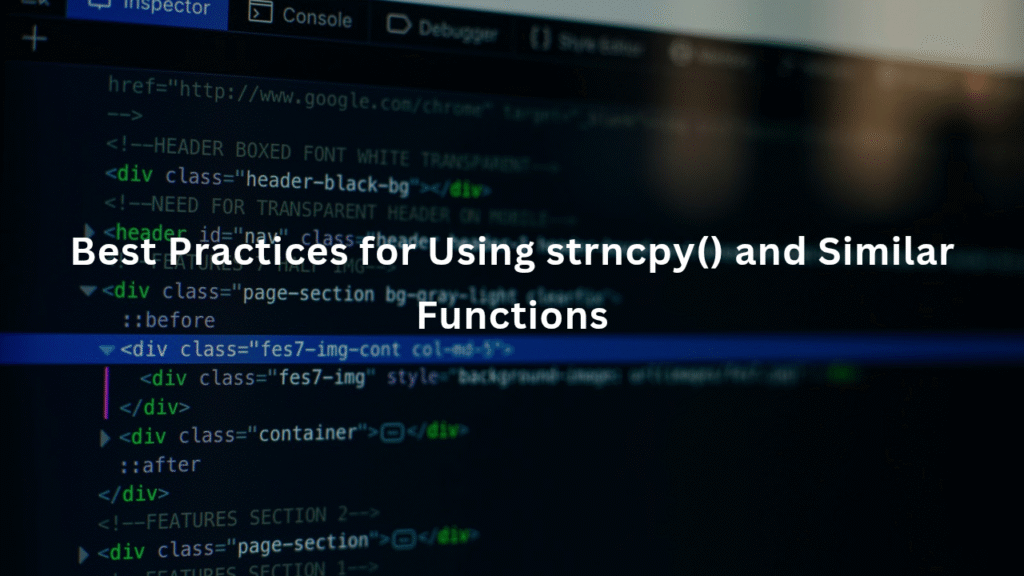
In the world of systems programming, especially in C and C++, string manipulation is both essential and risky. The standard library offers a suite of string functions, but not all of them are designed with safety in mind.
Many serious bugs, like memory errors and broken data, come from using string functions like strcpy, strcat, and sprintf the wrong way.
While working on old code for a hardware monitor, we found that a simple strcpy with no checks was causing the program to crash every now and then.
This is what pushed us to take a hard look at using safe string handling functions C pp strncpy, and it’s a decision that fundamentally improved the stability and security of our system.
Key Takeaways
- strncpy doesn’t always add a zero at the end of the string, which can lead to bugs or even security problems.
- Many bugs in C and C++ happen because of problems with string handling and buffer overflows. That’s why it’s really important to be careful with buffer size and making sure strings end correctly.
- Handling strings safely takes practice and careful thinking. You have to build good habits, stay alert, and never just trust how things work by default.
The Basics: Why C and C++ Make Strings Difficult
C and C++ don’t protect you from yourself. Strings are just arrays of characters, usually null-terminated. If you’re copying data into one of these arrays, there’s nothing to stop you from writing past the end. This is the root of the problem.
We all know the classic mistakes:
- Forgetting the null terminator.
- Assuming the destination buffer is big enough.
- Not checking the source string length.
Each of these can cause subtle bugs, weird crashes, or, worst of all, security holes. A single wrong copy can trash memory in ways that look unrelated to the line that caused it.
Understanding the Risks of Unsafe String Handling
C and C++ let you control things very closely, but that also means you have to take care of the memory yourself. Unlike higher-level languages, there’s no automatic boundary checking in standard string functions.
Take this simple example:
c
char dest[10];
strcpy(dest, “This is a very long string!”);
The code will build just fine, but when it runs, it might go past the end of dest, mess up memory, or even make the program crash.
We encountered an issue eerily similar to this during a routine update. A utility tool used for logging system events failed during certain large data sets. The culprit? A rogue strcpy that copied unchecked user input to a fixed-size buffer.
From that point on, we committed to using safe string handling functions C pp strncpy wherever possible.
What is strncpy() and How Is It Safer?
People often say to use strncpy() instead of strcpy() because it lets you set a limit on how many characters to copy.
c
strncpy(dest, src, sizeof(dest) – 1);
dest[sizeof(dest) – 1] = ‘\0’; // Always null-terminate
This helps stop buffer overflows by only copying a set amount of data into the destination. Unlike strcpy(), which keeps going until it finds a zero, strncpy() stops after the number you tell it.
However, strncpy() is not foolproof:
- It doesn’t null-terminate the destination string if the source is longer than n.
- It can leave trailing nulls if the source is shorter than n, potentially wasting space.
Even though strncpy() isn’t perfect, it can be very helpful if you use it carefully and always remember to end your string with a zero.
Safe String Handling in C vs C++
Credit by Neso Academy
In C++, you have the luxury of std::string, which handles memory management for you. However, many C++ projects still interact with C APIs, embedded environments, or fixed-size char arrays, especially in performance-critical areas. (1)
So, using safe string handling functions C pp strncpy applies just as much in C++ as in C, especially if your application has:
- Legacy C code
- External C libraries
- Network protocols that expect char arrays
- Security-critical memory layouts
In one project, we were developing a C++ daemon that communicated with an older C library over a socket. We couldn’t use std::string for some buffers, so we used strncpy() carefully, making sure not to go past the limits. That way, the data stayed safe between parts of the program.
Best Practices for Using strncpy() and Similar Functions

Even though strncpy() is seen as a safer choice than strcpy(), using it the wrong way can still lead to bugs, crashes, or security problems.
Based on our experience fixing and updating old C code, these are the best tips we follow when using strncpy() and similar string functions:
Always Null-Terminate
One of the most common pitfalls with strncpy() is assuming it will always null-terminate the destination buffer. It won’t if the source string is equal to or longer than the number of characters to copy, the destination will not be null-terminated.
Safe example:
c
char buffer[100];
strncpy(buffer, user_input, sizeof(buffer) – 1);
buffer[sizeof(buffer) – 1] = ‘\0’;
We use this rule in all our code and even set up tools to warn us if we forget to add a zero at the end after using strncpy().
Avoid Truncation When Possible
Truncation occurs when the input string is longer than the buffer and gets cut off. While strncpy() prevents overflows, it does not notify you when truncation happens. This quiet mistake can mess up how things work or cause tricky bugs, especially in settings, logs, or names.
To stay safe, you should check the size of the input before copying it, and clearly handle what happens if it’s too long. This allows you to log warnings, reject the input, or take corrective action early.
Example:
c
if (strlen(user_input) >= sizeof(buffer)) {
// Optional: warn the user, log the event, or truncate explicitly
fprintf(stderr, “Warning: input string will be truncated.\n”);
}
strncpy(buffer, user_input, sizeof(buffer) – 1);
buffer[sizeof(buffer) – 1] = ‘\0’;
In our codebase, we introduced a macro that logs truncation occurrences during development builds. This approach helped us identify unsafe assumptions and eliminate future bugs before they reached production.
Use Custom Wrappers for Consistency
Using strncpy() safely isn’t easy. You have to check the length, see if the string gets cut off, add a zero at the end, and sometimes write log messages to help with debugging.
To make this easier and avoid mistakes, we like to wrap all these steps inside a helper function we can reuse.
By using the same way to copy strings everywhere, you avoid repeating code and make it easier to fix or change later.
Example wrapper function:
c
void safe_str_copy(char* dest, const char* src, size_t size) {
if (size == 0 || dest == NULL || src == NULL) return;
strncpy(dest, src, size – 1);
dest[size – 1] = ‘\0’;
}
We adopted this wrapper as part of our internal string utilities. Later, it became a central hook where we added optional logging, input validation, and memory sanitization. A small investment up front turned into long-term safety and developer convenience.
Prefer snprintf() for Combined Formatting + Copying
If you need to build strings by adding pieces or putting in values, don’t mix strncpy() and strcat(). Instead, use snprintf() it puts everything together safely in one step and always ends the string with a zero.
Example:
c
char dest[100];
snprintf(dest, sizeof(dest), “%s %s”, first_name, last_name);
With snprintf(), you gain:
- Automatic null-termination (even when truncated)
- Formatting capabilities similar to printf()
- A return value that tells you if truncation occurred
You can even use the return value to detect and handle truncation:
c
int written = snprintf(dest, sizeof(dest), “%s %s”, first_name, last_name);
if (written >= sizeof(dest)) {
// Truncation occurred
log_warning(“Full name truncated: ‘%s %s'”, first_name, last_name);
}
In one of our networking modules, we replaced multiple chained calls to strncpy() and strcat() with a single snprintf() call.
Not only did the code become more compact and readable, but it also eliminated a truncation bug that caused a protocol mismatch during handshake negotiation.
Buffer Size Calculation: Our Rules of Thumb
A lot of trouble comes from not calculating buffer sizes right. We’ve learned to: (2)
- Use sizeof(buffer) wherever possible, not a hardcoded length.
- Reserve one byte for the null terminator.
- Document buffer sizes in comments, especially if the size is passed from elsewhere.
Once, a teammate used strncpy(buffer, input, 12) on a 12-byte buffer. The input was sometimes exactly 12 bytes long, so the buffer wasn’t null-terminated.
It broke a parser that expected a zero at the end. The fix was changing the copy to strncpy(buffer, input, 11); buffer[11] = ‘\0’;
Conclusion
Being safe with strings in C and C++ takes more than just using functions like strncpy(). You need to understand how these functions really work when your program runs.
We’ve seen how improper use can lead to subtle truncation bugs, crashes due to missing null-termination, and unreadable code from repeated boilerplate.
Through experience, we learned that consistency, discipline, and simple safeguards like custom wrappers and proactive truncation checks go a long way in reducing risk.
If you’re working with C or C++, especially in performance-critical or security-sensitive contexts using safe string handling functions C pp strncpy isn’t optional it’s foundational.
Want to go further in mastering secure C/C++ practices? Join the Secure Coding Bootcamp and learn how to build safe, reliable software with confidence.
FAQ
Is strncpy() always safe?
No. strncpy() prevents buffer overflows but can leave your string unterminated. Always manually null-terminate after use.
What’s better: strncpy() or strcpy()?
strncpy() is generally safer because it limits how much data gets copied. strcpy() continues copying until a null byte, which can cause overflow if unchecked.
Can I use strncpy() in C++?
Absolutely, especially when dealing with char arrays, system-level programming, or interfacing with C code. For dynamic strings, std::string is preferable.
Should I always use strncpy() over strcpy()?
Yes — unless you’re 100% certain the buffer is large enough and the input is sanitized, strncpy() offers a safer alternative.
What’s the difference between strncpy() and snprintf()?
strncpy() copies a string without formatting. snprintf() formats and copies in one step, with better null-termination behavior.
Why is manual null-termination important?
Because functions like strncpy() do not guarantee null-termination when truncation happens. Leaving a string unterminated can cause undefined behavior during future reads.
What happens if I copy more characters than the destination can hold?
You risk a buffer overflow, which may crash your program, corrupt memory, or open security vulnerabilities. Always ensure your copy length is within bounds.
References
- https://learn.microsoft.com/en-us/windows-hardware/drivers/kernel/using-safe-string-functions
- https://docs.vultr.com/cpp/standard-library/cstring/strcpy

